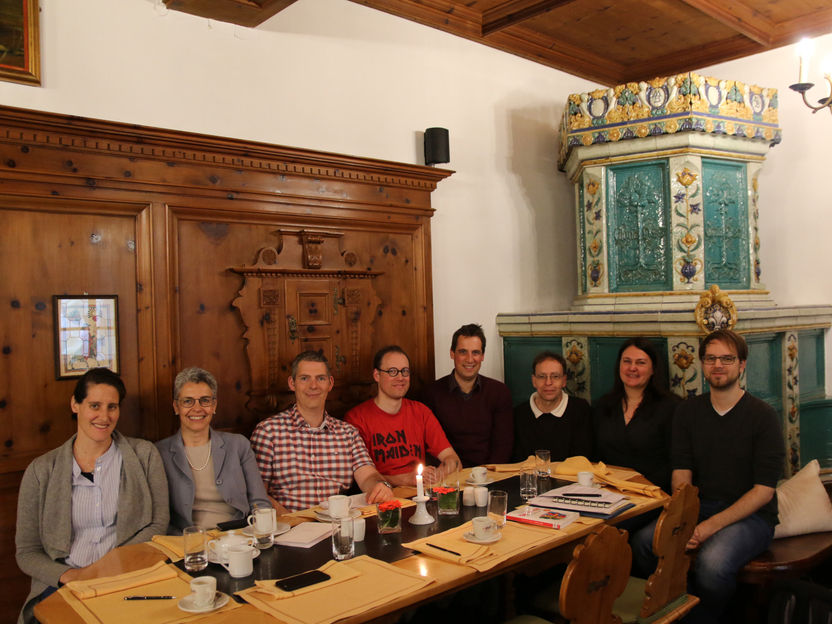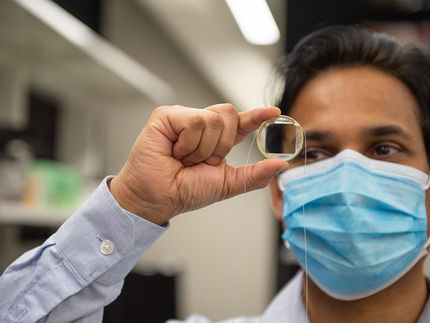German scientific society for microscopy founded
The “German BioImaging - Gesellschaft für Mikroskopie und Bildanalyse” (GerBI-GMB, Society for microscopy and Image Analysis) was founded towards the end of April 2017. The University of Konstanz plays a leading role in coordinating microscopy core facilities across Germany, which is why the founding assembly was held in Konstanz. The Konstanz biochemist Professor Elisa May has been spokesperson for German BioImaging (GerBI), a national network of microscopy centres founded by the German Research Foundation (DFG), since 2012. She is now also the chairwoman of the new society. The first members’ assembly held during the “GerBI Annual Community Meeting” in Fulda on 3 May appointed Professor Stefan Hell as honorary member of GerBI-GMB. In 2014, Hell, along with Professors Eric Betzig and William Moerner, was awarded the Nobel Prize for Chemistry for the development of super-resolution microscopy.

Founding assembly on 28 April 2017 (left to right): Dr Sylvia Olberg (University of Freiburg), Professor Elisa May (University of Konstanz), Dr Stefan Terjung (European Molecular Biology Laboratory, EMBL, Heidelberg), Dr Christian Liebig (Max Planck Institute for Developmental Biology, Tübingen), Dr Martin Stöckl (University of Konstanz), Dr Roland Nitschke (University of Freiburg), Dr Nadine Utz and Dr Stefan Helfrich (both University of Konstanz).
Universität Konstanz
The “Gesellschaft für Mikroskopie und Bildanalyse” represents the interests of scientists, experts and core facilities working in the fields of microscopy and image data analysis in the life sciences in Germany. The not-for-profit organisation is also going to represent the field of biological image data analysis. Being able to process and quantify huge amounts of microscopic image data is essential to modern image-based biological research. Over the past two years, the German BioImaging network has therefore established close ties with the relevant scientific community. The society, which is based in Konstanz, also supports communication and exchange with the public on topics related to microscopy and image analysis.
Unlike most European countries with a strong research track record, Germany has not had its own scientific society for light microscopy - until now. This is all the more surprising, given the fact that the foundations for optics and light microscopy were, to a large extent, laid in Germany in the mid-19th century by Carl Zeiss, Ernst Abbe and Ernst Leitz.
The new society has emerged from the German BioImaging network and will continue its work. In 2012, the network first brought together German scientists and researchers who develop and use microscopes. Research institutions increasingly pool expensive and complex research equipment at core facilities in order to make them easily available to all researchers. The DFG has provided an important impetus for strengthening and professionalising core facilities with its “Gerätezentren - Core Facilities” programme. Continuing the network as an independent German society for microscopy was one of the three main objectives of the renewal proposal that was accepted in 2015. Elisa May, the network’s spokesperson, was the applicant.
Biochemist Elisa May heads the University of Konstanz’s Bioimaging Center (BIC). It has provided services as well as scientific consulting for light microscopy and image data analysis since 2008. In her research, Elisa May works on the applications of modern femtosecond fibre lasers in biological imaging. She also participated in the “Proof-of-Concept” study of the EU-led “Euro-BioImaging” project, which aims to establish a coordinated infrastructure for biomedical imaging across Europe. Elisa May completed her Habilitation in cellular biology and molecular toxicology at the University of Konstanz in 2005.
Most read news
Organizations

Get the analytics and lab tech industry in your inbox
By submitting this form you agree that LUMITOS AG will send you the newsletter(s) selected above by email. Your data will not be passed on to third parties. Your data will be stored and processed in accordance with our data protection regulations. LUMITOS may contact you by email for the purpose of advertising or market and opinion surveys. You can revoke your consent at any time without giving reasons to LUMITOS AG, Ernst-Augustin-Str. 2, 12489 Berlin, Germany or by e-mail at revoke@lumitos.com with effect for the future. In addition, each email contains a link to unsubscribe from the corresponding newsletter.























































